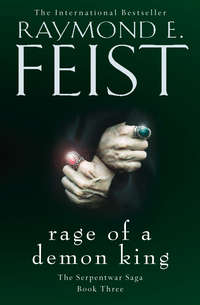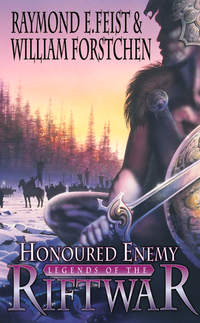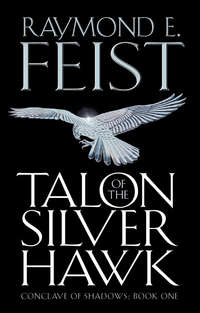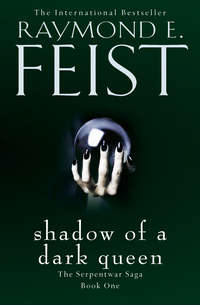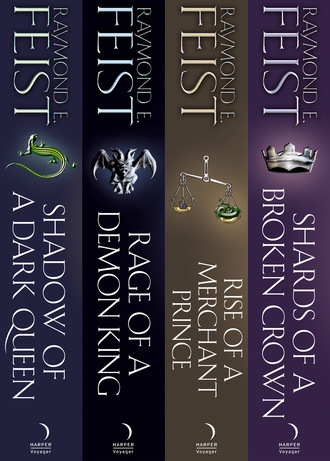
Полная версия
Boldar blew out his cheeks. ‘There are several oracles …’
‘I’ve consulted with the Oracle of Aal.’
‘If she doesn’t know, then none of them do,’ he observed. ‘There’s the Toymaker.’
‘Who is he?’
‘A creator of devices, several of which may be used to spy out people who don’t wish to be seen. But he’s somewhat mad and therefore undependable.’
‘Who else?’
The waiter appeared with a round of drinks, placing a frosty mug of something that looked like ale before Boldar and a large crystal goblet before Miranda. He made a show of unfolding napkins and placing one in Miranda’s lap and the other in Boldar’s. He said, ‘Compliments of my master,’ and withdrew.
The wine was delicious and Miranda drank deeply, discovering she was quite thirsty – and hungry.
‘There’s Querl Dagat,’ said Boldar. ‘He deals in information; the more improbable, the better he likes it … as long as it’s true. For that reason, he’s a full cut above the average rumormonger hereabouts.’
Miranda picked up her napkin to blot her lips, and a folded piece of paper fell to the floor. She looked down, then at Boldar, who bent over and picked it up. He handed it to her unopened.
She took it and unfolded it to find a single word. ‘Who’s Mustafa?’ she asked.
Boldar slammed his hand down upon the table. ‘The very fellow we must see.’
He glanced around and said, ‘Up there,’ pointing to the gallery.
He rose and Miranda followed; they wended their way through the press of tables and alien bodies. Reaching a stairway, they climbed to the first of the two overhanging galleries. Miranda was surprised to discover that the gallery was but one side of a wide promenade, which had large corridors stretching away. ‘Is all this part of the Inn?’
Boldar said, ‘Certainly.’
‘How big is it?’
‘Only Honest John knows for certain.’ He led her past booths offering all manner of goods and services, several lewd, a score or more clearly illegal anywhere Miranda had ever been, and many incomprehensible. ‘Rumor has it that John was a barkeep on his homeworld who was run out of his birth city over some dispute. A roving band of some sort of aboriginal people chased him, and he blundered into the entrance to the Hall. As fate would have it, he appeared in the Hall in the midst of a battle. It has been said that, not knowing any better, he jumped into the void opposite the door he had entered, discovering the first entrance into the stable place in which the Inn is now housed.’
Boldar moved down a side corridor. ‘He blundered around in a strange darkness, then somehow found his way back to the Hall, moving back to his homeworld once he was certain the aborigines were gone and returning to his birth city. Over the years he came back to the Hall, exploring and trading. When he finally had some sense of the society within the Hall, he decided the Inn was what would make him rich. He made some deals, hired some workers, and returned here to establish his small inn. He’s added onto it over the years, until now it’s a small township. Whenever he adds onto the building, he encounters no limit to the size he can increase his holdings, or at least not so far.’
‘Has it?’
‘What?’
‘Made John rich?’
Boldar laughed, and again Miranda was struck by how boyish the mercenary looked. ‘I suspect that by any reasonable measure, John is the richest man in creation. He could buy and sell worlds should he choose. But like most of us, he’s found that after a while riches are only a means to keep oneself amused or to keep tally on how well one does in the various games and transactions in the Hall.’
Reaching a doorway hung with a curtain, Boldar called, ‘Mustafa, are you in?’
‘Who wants to know?’
That got a laugh from Boldar, who swept aside the curtain, indicating Miranda should enter. She did and found herself inside a small room with but a single table, upon which a solitary candle burned. Otherwise, the room was without distinction – no wall hangings or other furniture, just another door in the wall facing the one through which they’d entered.
A man stood behind the table, his face nearly black, like aged and oiled leather. A white beard adorned his cheeks and chin, though his upper lip was shaven, and his head was covered with a green turban. He bowed. ‘Peace be upon you,’ he said in the language of the Jalpur.
‘Upon you be peace,’ answered Miranda.
‘You seek Pug of Stardock?’ he asked.
Miranda nodded. Glancing at Boldar, she raised an eyebrow in question.
Boldar said, ‘Mustafa’s a fortune-teller.’
Mustafa said, ‘You must first cross my palm with gold.’ He held out his hand. Miranda reached into her belt and withdrew a coin, placing it upon his hand. He put it in his own belt pouch without looking at it. ‘What do you seek?’
‘I just told you!’
Mustafa said, ‘You need to say it aloud!’
Fighting off irritation at what she thought was needless show to convince gullible travelers, Miranda said, ‘I need to find Pug of Stardock.’
‘Why?’
Miranda said, ‘That is my business, but the need is great.’
‘Many look for this man. He has taken precautions against being followed by those he would rather not encounter. How may I know you are not such a one?’
Miranda said, ‘One may vouch for me, but he is back upon the world of Midkemia: Tomas, friend of Pug.’
The Dragon Rider.’ Mustafa nodded. ‘That is a name few would know who meant to harm Pug.’
‘Where might I find him?’
‘He seeks alliances and goes to speak with the gods. Seek him in the Celestial City, in the Hall of the Gods Awaiting.’
Miranda said, ‘How do I get there?’
‘Return to Midkemia,’ answered Mustafa, ‘and get you to the land of Novindus. In the great mountains, the Pillars of the Stars, find the Necropolis, the home of the Dead Gods. There, atop the peaks of the mountains, there is a hall in which those gods waiting to be reborn abide. Go there.’
Miranda didn’t wait, but rose and left, leaving Boldar standing alone with Mustafa. After a second, Boldar said, ‘Is this true? Or are you doing one of your carnival acts?’
Mustafa shrugged. ‘I don’t know if it’s true. That’s just what I was paid to say.’
‘Who paid you?’
‘Pug of Stardock.’ The old man took off his turban, revealing a nearly bald pate. Scratching his head, he said, ‘I suspect it’s probably another false lead. I have the distinct impression this Pug is a man who doesn’t wish to be found.’
Boldar said, ‘This gets interesting. I think I’ll catch up with her and see if she needs help.’
Mustafa shook his head and said, ‘Find him or not, I have a feeling she’s going to need a great deal of help before this is over. Some idiot left open a critical gate to the demon realm, and a couple of realities could be in jeopardy as a result.’ He yawned.
Boldar was about to ask what that meant, but considered Miranda getting too far ahead, so he said nothing and left.
A moment after Boldar left, the other door opened and a man stepped through. Small but striking, he had dark hair and eyes and a closely trimmed beard, and wore a simple robe of black. He reached into a pouch at his belt and pulled out some gold coins. Handing them to Mustafa, he said, ‘Thank you. You did well.’
‘Anytime. What are you going to do now?’
‘I think I’ll go set up a small test.’
Mustafa said, ‘Well, enjoy yourself. And let me know how the situation with the demon realm turns out; things could get busy around here if they get loose.’
‘I will. Good-bye, Mustafa,’ said the man as he began to move his hands.
‘Good-bye, Pug,’ responded Mustafa, but by the time he had spoken. Pug of Stardock had vanished from sight.
• Chapter Fourteen • Journey
Erik dismounted.
Roo grabbed the reins of Erik’s and Billy’s horses and led them away. Erik and Billy ran forward, weapons at the ready, while the maneuver was repeated up and down the line.
Since leaving Brek’s at Shingazi’s Landing two weeks before. Calis had been drilling the men continually. They were now being trained as mounted infantry. At the first sign of attack, one man in three would lead the horses to be staked behind the line while the other two made a defensive position where instructed. The men had complained about this, saying it made no sense to leave a perfectly good horse and get down to fight, but the complaints had fallen on deaf ears.
Nakor had laughed it off, saying only, ‘Man and horse gives a much bigger target than man on foot hiding behind a rock.’
The drills were becoming second nature to Erik and the others, who now waited to see what would happen next. Sometimes, nothing; other times, Hatonis’s company of clansmen from the City of the Serpent River would ‘attack,’ and the results could be painful. The drills were conducted using heavy wooden swords, weighted with lead rods, that were twice the heft of a normal shortsword. Erik swore his own sword was feather-light in his hand after weeks of drilling with the false swords, which he supposed was the point of it all, but the wooden swords could leave heavy welts and even break bones, and the clansmen from the City of the Serpent River seemed to take delight in embarrassing Calis’s company.
Erik didn’t understand the politics of this strange land; he knew that Calis and Hatonis were old friends, or at least friendly acquaintances, but the other men from that distant city seemed either suspicious or contemptuous of Calis’s men. He asked and was told by one of the soldiers from Calis’s last voyage that clan warriors simply didn’t have much use for mercenaries. Erik took this to mean that only a few leaders, such as Hatonis, knew of their real purpose in coming to this distant land.
Erik heard a rattle behind him and knew that Roo had returned and was laying down the odd short spears they had picked up at Brek’s. Soft iron, they were designed to be thrown at charging opponents, either injuring them or fouling their shields. Once they struck something, they were useless, as they bent easily, so the enemy couldn’t throw them back. A shout went up from a crest nearby and suddenly it was raining arrows. Erik raised his shield, crouching low behind it, and felt two shafts strike and shatter on the heavy metal and wood. A curse nearby told Erik that Luis hadn’t been as fortunate, and had been struck by the dull point of a practice shaft. Not lethal, these shafts nevertheless stung when they struck, and occasionally they could cause real injury.
Then another shout signaled the charge, and Erik rose, gripping one of the heavy iron spears. ‘Ready!’ shouted de Loungville. As the charging clansmen came near, Erik tensed, and as if reading his mind, de Loungville shouted, ‘Wait for it!’
As the clansmen bore down upon them, the men of Calis’s company waited until de Loungville shouted, ‘Throw!’ and Erik and the others motioned throwing the pilum, as the short soft spear was known in the Quegan tongue. Having no practice pilum to use, they couldn’t throw the weapon, so after pantomiming a cast, each man dropped his spear next to where they waited and, with a few audible groans, readied the ponderous practice swords.
Erik recognized the man bearing down on him, a large somber fellow named Pataki. Erik braced himself and let the man throw the first blow, which he easily caught on his shield. He stepped slightly to his left and threw a roundhouse blow with his sword that got over the top of Pataki’s shield and caught him behind the head. Erik winced, for he knew the blow must hurt, despite the helm the other man wore.
Glancing around, he saw that his companions were easily repulsing the attackers, and within a minute the clansmen threw down their swords and removed their helms in the mercenary’s sign of surrender. A few of Calis’s company cheered the victory, but the majority were content to stand motionless for a few minutes. Riding most of the day, then suddenly fighting a battle – even if only a mock skirmish – took its toll; most of the men learned to steal rest whenever it was possible, even if only for a minute.
‘All right,’ shouted Foster. ‘Pick ’em up!’
Erik got his practice sword under one arm and was starting to retrieve his pilum when he heard Billy say, ‘This one’s not moving!’
Erik saw that Pataki was still lying facedown in the dust. Roo was the first to reach him and rolled the bulky man over. He then leaned over and after a moment said, He’s still breathing, but he’s out cold.’
De Loungville hurried over. ‘What’s this?’
Erik picked up his pilum. ‘I caught him on the back of the head. I hit him harder than I intended, I guess.’
‘You guess,’ said de Loungville, his eyes narrowing as if he was about to launch into another reprimand. Suddenly he grinned and said, ‘That’s my lad!’ He told Roo, ‘Toss some water on him and get your kit together.’
Roo rolled his eyes heavenward and hurried to where the horses were picketed. He fetched a waterskin and doused the motionless man. Pataki came awake, spitting out the water, and once he had regained his feet, returned to his own company.
Erik carried his set of pilum, practice sword, and shield to where the horses were waiting. He loaded up his equipment, then waited for Roo to catch up. When the shorter man returned, he said, ‘You really caught him with that head shot.’
‘You saw?’
‘I was unoccupied at the moment. The fellow who came at me was blind-sided by Billy, so I had nothing to do.’
‘You could have lent me a hand,’ Erik said.
‘As if you needed one,’ said Roo. ‘You’re turning into something of a terror with that practice sword. Maybe you ought to keep with it when the real fighting starts. You can bludgeon with it better than most men can cut.’
Erik half smiled and shook his head. ‘Maybe I’ll find one of those big dwarven war hammers and smash rocks, too.’
‘Mount!’ came the order from Foster, and with accompanying groans the men complied.
Moving into position, Erik and Roo fell in with Sho Pi, Biggo, Luis, and Billy. The company waited. Then came the order to ride. There was at least another hour of daylight before they’d be ordered to make camp, and that would entail another two hours of work. Erik glanced at the sun, an angry red globe lowering in the west, and said, ‘It’s too damn hot for this time of year.’
From behind him, Calis said, ‘The seasons are reversed here, Erik. It’s winter in the Kingdom, but it’s early summer here. The days are getting longer and hotter.’
‘Wonderful,’ said Erik, too tired to wonder how the Captain had come to be riding next to him.
‘When we spar with the clansmen,’ said Calis, with a faint smile, ‘try to be a little more subdued with them. Pataki’s a nephew of Regin, the Lion Clan chieftain. If you’d broken his head, it would have strained things a bit.’
‘I’ll try to remember, Captain,’ said Erik without humor.
Calis set heels to his horse and moved toward the head of the line. Roo said, ‘Was he joking?’
‘Who cares?’ said Billy Goodwin. ‘It’s too hot, and I’m too tired to worry about it.’
Biggo, who rode next to Billy, said, ‘That’s strange.’
‘What?’ asked Roo.
‘The sun’s so red, but it’s another hour or more to sunset.’
Looking toward the west, they nodded. ‘What could be causing it?’ asked Luis, from his place behind Biggo.
‘Smoke,’ answered a clansman who was riding past. ‘Word came last night that Khaipur was falling. That must be it burning.’
Roo said, ‘But that’s hundreds of miles from here! At least, that’s what the Captain said!’
Sho Pi spoke softly. ‘Very big fire’ was all he said.
The training wore on, and Erik and the others no longer had to think about what to do; they just did it. Even the routine of building fortifications every night became commonplace; Erik ceased being astonished at how much work the seventy-five men could accomplish.
Once the routine was established, Calis and de Loungville would disrupt it, seeking to keep the men constantly alert. As the days wore on, Erik thought it unnecessary.
Riders came and went as messages were carried from various agents Calis had established over the years. Rather than take years to establish its control over the surrounding countryside, the host of the Emerald Queen was driving on the city of Lanada.
Riding in the second company, Erik heard Calis speaking to Hatonis and one of the riders who had just brought that news. ‘It was seven years between the fall of Sulth and the assault on Hamsa.’
Hatonis said, ‘But the invaders had to fight through the Forest of Irabek.’
‘Three years between Hamsa and Kilbar, then a year between Kilbar and Khaipur.’
Calis nodded. ‘As they control more of the continent, they seem more intent on accelerating their advance.’
De Loungville speculated, ‘Maybe the army’s getting too big to control and its generals have to keep it busy with conquest.’
Calis shrugged. ‘We need to change our line of march.’ To the rider he said, ‘Rest with us tonight and tomorrow return north. Carry word to the Jeshandi we will not be coming their way. We are going to leave the Serpent River and turn straight west. Pass the word to those who seek us that we are going to attempt to intercept the invaders between Khaipur and Lanada. Look for us at the Mercenaries’ Rendezvous.’
Erik and the others turned to look across the Serpent River, where in the distance they saw a vast valley of forests and meadows, and beyond that a small range of mountains. They would have to cross the river, ride through that and, once across the mountains, down into the river lands of the Vedra.
De Loungville said, ‘Do we turn around for the crossing point at Brek’s?’
Calis said, ‘No, it would lose us too much time. Send scouts ahead and find us a place to cross.’
De Loungville ordered riders forward, and two days later they reported a broadening of the river where the current was slow enough that rafting might be possible. Calis reached that point and agreed it was worth the try. He ordered the men to cut what little growth there was along the river to make a set of small rafts. A dozen men, including Erik and Biggo, made the treacherous crossing, poling their way from one side to the other, carrying lines that would be used to get the others across. On the far bank, the dozen men cut enough trees of a size to lash together logs into four rafts, each large enough to hold four horses. The horses for the most part cooperated, though one raft was lost on the second-to-the-last trip as a line parted and the logs broke apart. The horses and men jumped into the water as the raft disintegrated, and all the men were pulled out downstream, but only one horse made it to the shore.
There were sufficient remounts so that the losing of three horses was not a serious deprivation, but the thought of the animals drowning bothered Erik. He found that disturbing, for the specter of battle and men dying held no pain for him, but the idea of a horse, terrified as it was being swept downriver, made him very sad.
The valley swept from the fork in the river to the west, ending in a series of rising meadows, until at last they would have to crest the ridge of mountains. On the tenth day of the march, a scout returned to tell Calis of a party of hunters he had encountered ahead.
Erik, Roo, and four other men were sent ahead with Foster to negotiate with the hunters. Erik was grateful for anything that broke the monotony of the march. Every day had been toil without respite. As much as he enjoyed horses and working with them, Erik had never been a great rider. He found twelve hours in the saddle, interrupted only by walking beside the horses to rest them, making and breaking camp, mock combats, and a steady diet of dried rations more drudgery than even his worst days at the forge.
The countryside was sloping hills, all moving quickly up into peaks and crests. The mountains of this region topped out at a lower elevation than the biggest Erik was used to at home, but there were far more of them here. The three major peaks of Darkmoor were surrounded by many hills, but otherwise few true mountains. Mostly they were high plateaus and sloping hillsides. But here, while modest in altitude, the mountains were plentiful and steep, with quickly rising buttes and prominences, dead-end valleys and box canyons, hard granite cut by streams and rivers. Trees grew in abundance and none of the surrounding peaks rose high enough above the timberline to give them a clear point of reference as they traveled through the dense woods. Erik suspected this range of mountains might prove a hazard as well as an inconvenience.
The hunters were waiting at the agreed-upon location. Erik reined in as Foster dismounted, removed his sword belt, and approached with his hands open. Erik studied the hunters.
They were hill people, dressed in fur-covered vests and long woolen trousers. Erik suspected there were herds of sheep or goats secreted away in the local meadows. Each man carried an efficient-looking bow, not quite as impressive as the Kingdom longbow, but clearly powerful enough to kill a man or bear as well as a deer.
The leader was a grey-bearded man who stepped forward to speak with Foster, while the other three stood motionless. Erik glanced around and saw no sign of any horses; these men hunted on foot. Given the terrain, Erik judged that more sensible than trying to convince a horse to act like a donkey or goat. If the hunters’ village was any higher up the slopes, horses would be less than an inconvenience; they’d be a danger.
Two of the other men bore a strong resemblance to the leader, while the third appeared like him in manner only. Erik guessed they were a family, with the odd man perhaps being married to a daughter.
Foster nodded, reached into his tunic, and pulled out a heavy purse. He counted out some gold pieces and returned to where Roo held his mount. ‘You men wait here.’ With a motion of his head he made it clear that they were to keep the hunters from running off with the gold he just gave them. ‘I’ll bring up the rest of the company. These fellows have a way over the mountains that’s safe for the horses.’
Erik glanced at the steep rise of the landscape before him and nodded. ‘I hope so.’
While they waited, the hunters talked among themselves. The one who didn’t resemble the other three listened as the leader spoke, then without comment he turned and began to trot toward the tree line.
One of the soldiers, a man named Greely, shouted, ‘Where does he think he’s going?’ The hunter stopped. Greely’s command of the local language, learned on ship and while traveling, was better than Erik’s, but his accent obviously struck the hillmen as odd enough that they looked puzzled by the question.
The leader looked at him. ‘Do you think treachery?’
Seeing that all four hunters were ready to unsling bows and start firing if the wrong answer was forthcoming, Erik glanced at Roo; suddenly Roo said, ‘He’s sending his son-in-law home to tell his wife and daughter that he and his sons won’t be home for supper tonight. Am I right?’
The lead hunter nodded, once, and waited. Greely said, ‘Well … I guess that’s all right.’
The leader made a curt gesture and the fourth hunter began trotting off again. Then the leader of the hunters said, ‘And tomorrow, too. It’s a harsh two days over the ridge, with no easy time going down the day after, but once on the trail you’ll have that well enough without my help.’ He leaned upon his bow once more.
About fifteen minutes of silence followed, then the sound of horses approaching from the rear heralded Calis and his company’s approach. Calis rode at the head of the company and when he pulled up he spoke rapidly to the hunter. The exchange was so quick and heavily accented that Erik couldn’t follow most of it.
But in the end Calis seemed satisfied and turned to the others, who were still riding up behind. ‘This is Kirzon and his sons. They know a trail over the ridge and down into the Vedra River valley. It’s narrow and difficult.’


